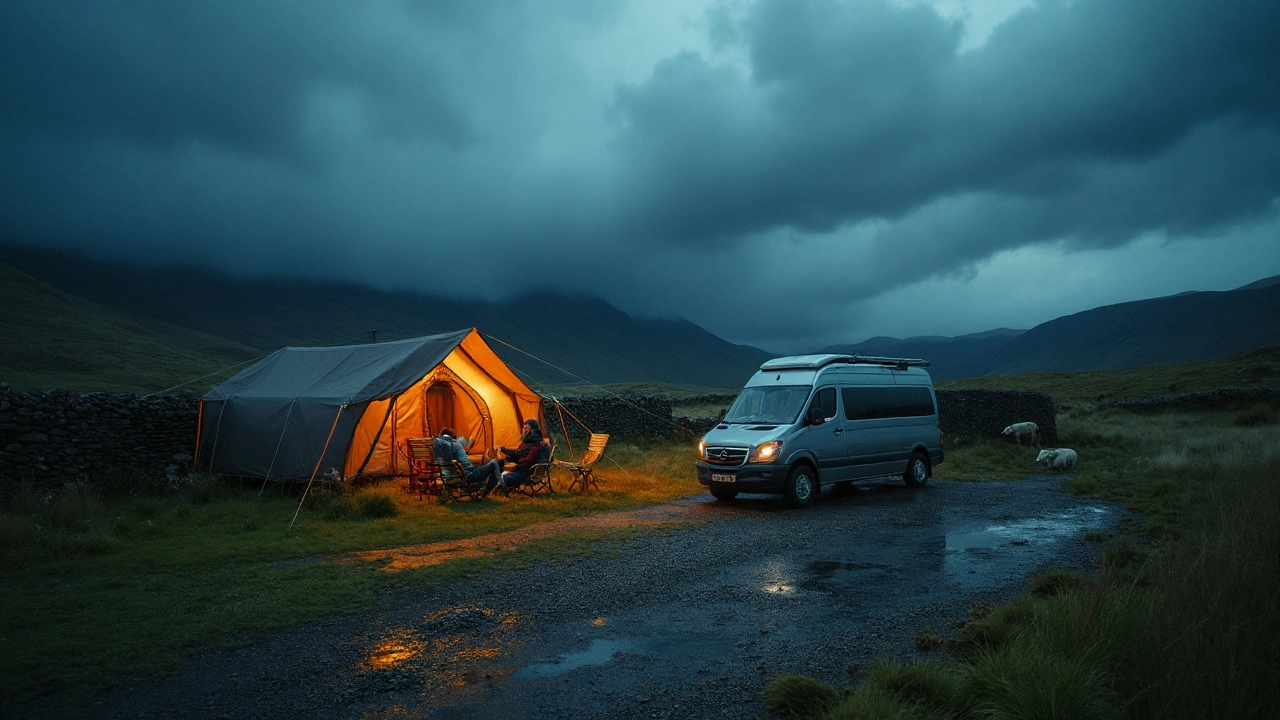
Are Campers Safer Than Tents? Risk‑by‑Risk Guide for UK Campers (2025)
Are campers safer than tents? A clear 2025 UK guide with risk-by-risk answers, trade-offs, checklists, and evidence-backed tips on CO, storms, theft, and driving.
Read MoreSetting up a tent sounds easy, but a few simple steps can mean the difference between a great night and a risky one. Below are practical tips you can follow the moment you arrive at a campsite.
First, look for flat ground without rocks or holes. A level surface stops your tent from tipping when the wind picks up. Avoid low‑lying areas that could collect water if it rains. If you’re near trees, stay at least 10 feet away – branches can fall or spark a fire.
Check the ground for hidden hazards. Sticks, thorns, or sharp objects can tear the tent floor. A quick sweep with your hands or a stick will save you from a puncture later.
Stake every corner tightly. Use the supplied stakes and hammer them in at a 45‑degree angle, pointing away from the tent. If the soil is hard, a rock or a piece of a metal pipe works as a makeshift anchor.
Guy lines aren’t just for big tents. Attach them to the corners and tension them with a knot you can release quickly. This extra support keeps the tent stable in gusty weather.
Make sure the rainfly is snug. Loose fabric can flap and wear out, and it reduces protection from rain.
Never build a fire under a tent or too close to trees. A 10‑foot radius is a safe rule of thumb. Clear leaves, twigs, and other flammable material from the fire pit area.
Keep a bucket of water or a sand container nearby. If the fire starts to get out of control, you can douse it fast.
Never leave a fire unattended. When you’re done, pour water over the embers, stir the ash, and pour more water until nothing glows.
Watch the sky. If clouds darken quickly, tighten all guylines and stakes. Close the tent doors and vents to keep rain out.
\nDuring a thunderstorm, stay inside the tent but avoid touching metal poles. The tent itself offers a small amount of protection, but the safest move is to move to a solid building if one is nearby.
If you’re using a heater, make sure the tent is well‑ventilated. Open a small vent or leave a door ajar. Carbon monoxide smells nothing, so a ventilated space is essential.
Never use a gas stove inside the tent. Cook outside, then bring food in once the flame is off.
Store food in airtight containers and keep them out of the tent. A scent‑free bag hung from a tree branch works well.
Dispose of trash properly. Leaving crumbs can attract foxes, badgers, or even larger animals that might investigate your tent.
Pack a small kit with a flashlight, extra batteries, a whistle, a basic first‑aid kit, and a multi‑tool. Keep it in an easy‑to‑reach pocket of the tent so you can grab it in a hurry.
Know the nearest exit or road. If you need help, the whistle can signal rescuers, and the flashlight helps you move safely in darkness.
Following these tips will let you set up quickly, sleep soundly, and enjoy the outdoors without worry. The next time you pitch a tent, remember the basics: choose a safe spot, stake it tight, respect fire, watch the weather, and keep food out of reach. Happy camping!

Are campers safer than tents? A clear 2025 UK guide with risk-by-risk answers, trade-offs, checklists, and evidence-backed tips on CO, storms, theft, and driving.
Read More